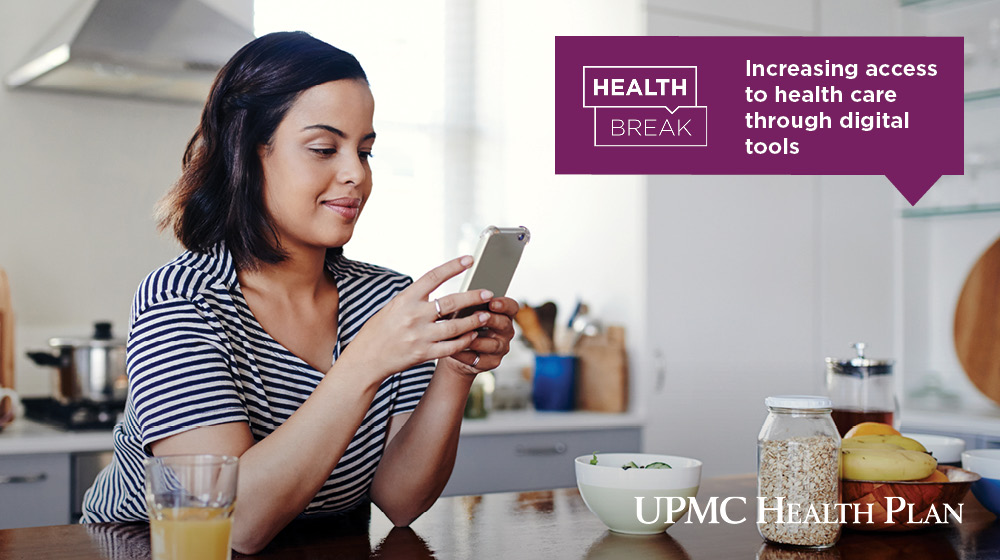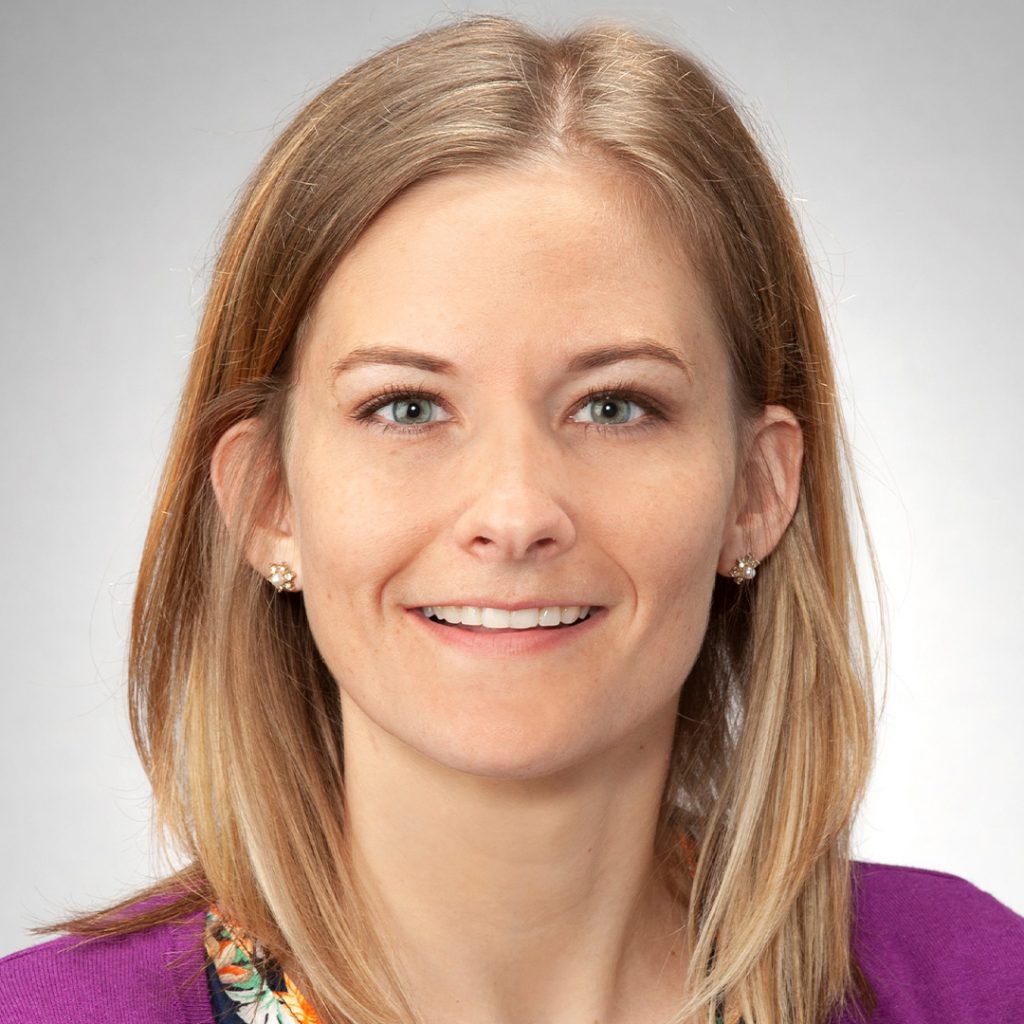Health Break: Increasing access to health care through digital tools

A podcast for UPMC Health Plan members, Health Break is your quick guide to caring for your mental and physical health, prioritizing wellness, and making the most of your health insurance plan.
Episode 16: Take a Health Break with Claire Marcus
Claire takes a Health Break with us to discuss accessing health care with digital tools. We’ll learn about UPMC Health Plan programs, tools, and services that are available to our members and the communities we serve.
Episode transcript:
Camille: Welcome to Health Break by UPMC Health Plan, your quick guide to health, wellness, and how to make the most of your health insurance plan. Listen during your coffee break, lunch break, or anytime you need a break. I’m your host, Dr. Camille Clarke-Smith. I help to oversee the quality of the plans we offer at UPMC Health Plan.
Alex: And I’m your co-host, Alex Treanor. I’m a senior health coach who works with our members on healthy lifestyle habits and goals. This is your… Health Break.
Hi everyone, I’m Alex Treanor. Today we’re joined by Claire Marcus to discuss how digital tools can provide and promote access to health care.
Claire, thanks so much for being with us today.
Claire: Thanks for having me.
Alex: To get us started, can you explain: What are digital health tools?
Claire: Yeah, there are many digital health tools out there. So to start with the individual user, digital health tools might connect you directly to a provider, help you navigate your care journey, and manage your health insurance. They do this conveniently in [a] high-quality way using digital devices and technology. And then for health care workers, digital tools might be things like remote monitoring or virtual triage. And these are used by providers and health plans to scale care, optimize patient experience, and improve outcomes.
Alex: Can you talk a little bit about how digital tools support access to health care?
Claire: Yeah, there are so many ways that digital tools enable access to care. Broadly, digital tools make it easier and more convenient for patients to access health care and to manage their health by allowing the care to come to the patient. And so what I mean by that is digital tools can connect doctors, nurses, counselors, you know, other health care professionals to you wherever you happen to be, or you can access evidence-based clinical programs in an app to improve and manage your health from the palm of your hand. So it’s really about reducing barriers, you know, meeting patients where they are and empowering them to better manage their health through technology.
Alex: Can you tell us more about virtual visits?
Claire: Absolutely. Virtual visits allow patients to connect with a provider with minimal disruption to their lives. So if you’re someone who has transportation or mobility challenges—if, you know, maybe you require childcare, or you have trouble taking time off of work, a virtual visit makes it much easier to access a provider by connecting with them in a video visit on your smartphone or computer. In our case, there are two main ways you can access virtual visits. So first, UPMC providers who offer scheduled virtual visits do so through the MyUPMC app. Through MyUPMC, you can schedule an appointment and conduct a video visit, but you can also access your lab results and even message your provider if you have questions. UPMC AnywhereCare has over 20 different programs. And these include virtual urgent care, mental health counseling, and ask a pharmacist, among others.
Personally, I’ve used virtual urgent care for my son. So quick story. One night before bedtime, I was putting him to bed and I noticed that he had like really red, kind of gooey eyes, right. And they did not look good. So I thought about rushing to urgent care, but it was late at night. And so rather than doing that, I picked up my phone and I used UPMC AnywhereCare. And it turned out that he had pink eye, which is pretty easy to treat, but you have to start treating it right away. So luckily I was able to get a prescription that night and start treating it that night, which meant I reduced the risk of spreading it to the rest of my family, and I got him back to daycare faster.
Alex: Wow. That’s a great example of the convenience of [UPMC] AnywhereCare. Now, when we talk about behavioral health and mental health resources, can digital tools help with that too?
Claire: Absolutely. Digital tools can certainly help us connect to resources for behavioral and mental health. Behavioral health is a good example of where telehealth can really help to expand access. In some cases, a patient might be concerned about others knowing that they’re experiencing depression or anxiety. So using telehealth, you can choose to see a therapist from your home, which might feel much more comfortable for some, or you can choose to use a product like RxWell and enroll in a program designed to manage stress, anxiety, and depression. RxWell connects you to a dedicated health coach, and that health coach provides guidance and helps you set personal goals. And you can work with your coach as much or as little as you want and engage with the program at whatever time works best for you.
Alex: If you had to highlight a few digital health tools that UPMC Health Plan members should know about, what would they be?
Claire: So for now, I’ll just focus on the mobile apps that you can download to your smartphone. For UPMC Health Plan members I recommend downloading four apps—and don’t worry, most of them share a login so you don’t have to remember so many passwords.
So first is the UPMC Health Plan member app to access your ID cards, review claims, and even live chat with Member Services. This app is also great because it can be your digital front door and connect you to all of the other apps that I’m going to describe.
Second is UPMC AnywhereCare to see a quality provider for a virtual visit within just a few minutes, or to access dozens of other services like counseling, health coaching, talking to a pharmacist, or even working with a care manager.
Third is RxWell for coaching to support mental health and wellness. So programs for weight management, quitting smoking, nutrition, et cetera.
And finally, MyUPMC to schedule provider appointments with your PCP or specialist.
Each of these apps offers multiple services on a single platform. And that makes sense, right? Because your health and your health care needs are likely to change over time. So while your needs might change, your starting point doesn’t—and by making that digital front door more accessible, we’re making care more accessible.
Alex: Thank you, Claire. In closing, what’s the one thing we should keep in mind about digital tools and our health care?
Claire: I think that one of the huge benefits of digital health tools is that they allow care to come to you—and the tools are designed and staffed by experts who can help you get the care that you need, help you manage your health more easily, and even often reduce your costs. Digital tools are not going to replace in-person care all of the time, but they do provide more options to effectively treat and manage care needs. So I would encourage you to check out the apps that I mentioned and see what services might help you in your health journey.
Alex: Thank you so much, Claire, for taking a Health Break with us today.
Claire: Thanks for having me.
Alex: Find show notes and more information at upmchealthplan.com/podcast. Join us as we explore other health and wellness topics in the next episode of Health Break.
This podcast is for informational and educational purposes. It is not medical care or advice. Individuals in need of medical care should consult their personal care provider. Views and opinions expressed by the hosts and guests are solely their own and do not necessarily reflect those of UPMC Health Plan and its employees.
Related to this episode:
- Access UPMC AnywhereCare.*
- Download RxWell.
- Learn more about what UPMC Health Plan is doing to address the needs of the communities we serve.
About Claire Marcus:

Claire Marcus is the director of Telehealth Technology & Solutions at UPMC Health Plan. In her role, Claire develops and implements strategies to expand use of telehealth and digital health technologies to improve member experience, increase access to care, and connect members to health and wellness resources throughout UPMC. Claire has been with UPMC since 2017 and has held various roles in Marketing, Product Management, and Digital Health Innovation. She is passionate about leveraging technology to improve health care and enhance the lives of UPMC’s patients, members, and community.
About Dr. Camille Clarke-Smith:

Camille Clarke-Smith, EdD, is a program director in the Quality Improvement, Medicare Stars Department at UPMC Health Plan, where she leads the Medicare Faith and Wellness Program, a 3- to 12-week health and wellness challenge. She is also the founder of the nonprofit Transforming the Health of African American Women (THAW) Inc. She earned a doctorate in health and physical activity education from the University of Pittsburgh in addition to a master’s in exercise science and a bachelor’s in psychology and sociology. She is currently pursuing her master’s degree in social work at Carlow University.
About Alex Treanor:

Alex Treanor is a lead health coach at UPMC Health Plan. As a lifestyle health coach, she specializes in helping you lose weight, eat healthy, get more physical activity, be less stressed, and quit tobacco. Alex has a master’s in Kinesiology, Integrative Wellness from Point Loma Nazarene University. She has been coaching since 2014 and is a Nationally Board Certified Health & Wellness Coach and Certified Personal Trainer. Alex is passionate about helping people improve their relationship with food and exercise while creating healthy, sustainable routines filled with enjoyment. Alex enjoys spending time with her husband, walking with her dog, and eating tacos in the sunshine.
*Members who are in Pennsylvania at the time of a virtual visit may select a UPMC-employed provider, subject to availability and discretion of the provider. Members located outside of Pennsylvania at the time of service or those who select Talk Therapy or Psychiatry services will receive care from a provider employed or contracted by Online Care Network II PC (OCN), also known as Amwell Medical Group. It is at the discretion of OCN providers to choose whether to treat patients ages 0 to 2. OCN is not an affiliate of UPMC. Limitations may apply for members of ASO plans who have opted out of coverage. Talk Therapy or Psychiatry services through AnywhereCare are not covered services for UPMC Community HealthChoices participants, UPMC for You members, or UPMC for Kids members. UPMC Children’s AnywhereCare is not available outside of Pennsylvania. If a member is under the age of 18, the member’s parent or legal guardian must be with the member during the video portion of the visit, and the child and parent or legal guardian must be in Pennsylvania during the visit. Providers are not available to treat members who are in Puerto Rico.



